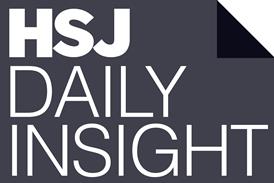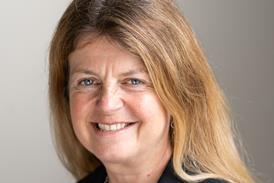A former top screening adviser to the government has challenged key claims made about “serious failings” in breast screening, including that problems were caused by a “computer algorithm failure”.
Dame Valerie Beral is a clinical epidemiologist with longstanding knowledge about the programme, including as chair of Department of Health and Social Care’s Advisory Committee on Breast Cancer Screening from 2002 to 2011.
She currently co-directs the major breast screening age extension trial (AgeX) at Oxford University.
On Wednesday, health and social care secretary Jeremy Hunt told the Commons that “analysis of trial data [had] found that there was a computer algorithm failure dating back to 2009”. He said: “The latest estimates I have received from [Public Health England] is that, as a result, between 2009 and the start of 2018 an estimated 450,000 women aged between 68 and 71 were not invited to their final breast screening.”
He also said a new IT system had provided new information, which had “highlighted that some women on the AgeX trial, set up to examine whether women up to the age of 73 could benefit from screening, were not receiving an invitation to their final screen as a 70-year-old”. He said: “Further analysis of the data quantified the problem and has found a number of linked causes, including issues with the system’s IT and how age parameters are programmed into it.”
He said it was estimated that up to between 135 and 270 women had died prematurely.
Dame Valerie told HSJ she did not agree with a number of assertions made about what had happened, including some by Mr Hunt.
She said she could not understand the basis for the figures he quoted for the number of women affected, or those who may have died prematurely.
She also said there had been no computer algorithm failure and no significant changes, which would have caused such a problem in 2009, when the trial began.
Instead, she said concerns about women missing out on screening invites appeared to arise from a misunderstanding about how the invitation system has worked since it began in 1988.
She said: “The basic system for inviting women for routine screening is the same as it was when the screening programme began in 1988.
“AgeX offered additional screening for some women who had already been offered all their routine screens. There was no change in 2009 in who was invited for routine screening.”
Several other sources familiar with the issue have also told HSJ they did not believe the root cause was a computer or algorithm failure, and that errors and confusion had instead occurred in how the requirements for the programme were set, and how it was governed and overseen.
These are matters which appear to lie primarily with PHE, which last week apologised and which carries out most coordination and oversight of the services, although NHS England commissions them.
Invitation system
Dame Valerie said the concerns in recent days, which have been examined by officials over the past few months, appeared to relate to some women not receiving a screening invite between 68 and 71. But she said this was a long-standing feature of the routine invite system as it was designed, rather than an error, as may have been assumed.
She said that under the system, women are offered routine screens three-yearly in a target age range of 50 to 70. Selection has always been based on women’s year of birth and their age at the end of the calendar year, rather than their age at the time of the invitation, she said.
The age of the first invitation and screen varies, as does the age of the other screens, including the final one, under the design of the system. For example if a woman had her first screen at age 50 her seventh and last invite would be at age 68, and if her first was at 52 her last would be at 70.
The system also means that some women receive their first invitation when they are aged 49, when they are due to become 50 in that calendar year. This group of women had always received their final screening invitation - normally the seventh they have received - at age 67, Dame Valerie said.
At age 70, these women, who would be due to turn 71 in that calendar year, are not sent another invite, as they are not eligible according to the IT system in place for issuing routine invitations. They therefore receive no invite within 36 months before their 71st birthday.
Dame Valerie said confusion seemed to relate to when PHE took over responsibility for the programme in 2013, and screening specifications were changed.
Service specifications released by NHS England and the DHSC in November 2013 stated that “women who have already attended for screening are offered screening again within 36 months of their previous screen until they reach 71”.
This indicates women should be invited for a final screen at the age of 70, even if they are due to turn 71 in that calendar year, and even if they have already received seven previous invites.
New IT system
In July 2016, a new national IT system, called Breast Screening Select, was introduced by PHE, allowing for much closer monitoring of women’s age and how recently they had been screened.
Dame Valerie said it appeared this system had alerted PHE and others involved in screening to the fact that some women had last been invited at age 67, but not between 68 and 71, contrary to what they had expected from their 2013 specifications.
She said it appeared that around 2016 PHE had sought to change this with a “failsafe” system. It was likely this was not properly implemented everywhere, she said, including that the failsafe system “failed to account for women in the AgeX trial”.
Meanwhile, several sources told HSJ that since responsibility for the programme was reorganised in 2012-2013, with the creation of PHE and NHS England, oversight had been particularly fragmented and a “mess”. The central team overseeing the programme was at this point moved from the DHSC to PHE, and HSJ was told this was followed by some senior staff leaving.
Dame Valerie also said concerns about harms to women had been overstated, as there is limited evidence of the clinical effectiveness both in terms of harms and benefits for women aged 70 and older.
A PHE spokesman, asked about the points raised, told HSJ that there had been an algorithm failure, and that it believed the estimates for numbers affected and premature deaths were credible, but did confirm that the specification for the programme was changed in 2013.
PHE chief executive Duncan Selbie said in a public message on Friday: “PHE identified data anomalies which led us to a thorough investigation into the IT invitation system.
“From this, it was found that a number of invitations to attend a final breast screening test for women aged between 68 and 71 had not been sent out as they should have been. We know this will be extremely distressing for many.
“On behalf of PHE and NHS breast screening services, our apology is heartfelt and unreserved.”
The DHSC was approached for comment, and referred HSJ to Mr Hunt’s earlier statement.



























9 Readers' comments